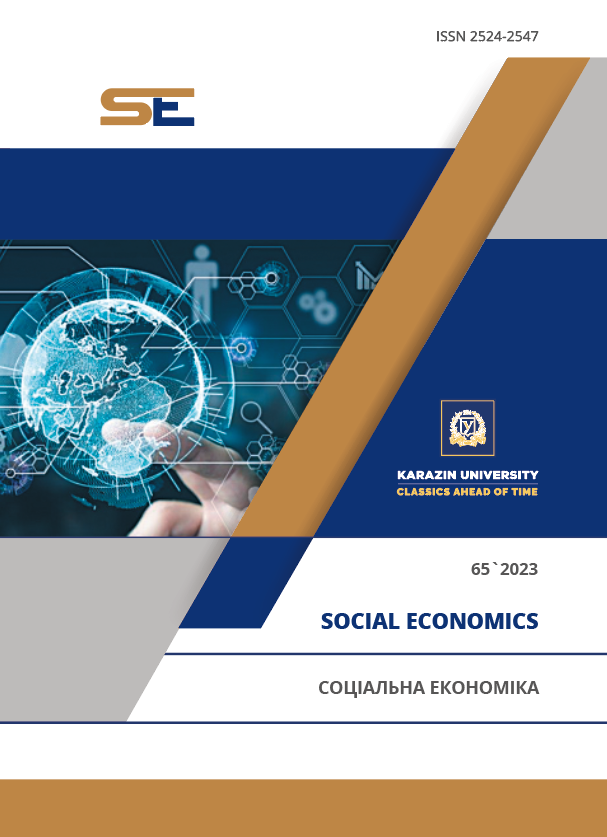ВПЛИВ ІНТЕЛЕКТУАЛЬНОЇ МІГРАЦІЇ НА ІННОВАЦІЙНИЙ РОЗВИТОК КРАЇНИ
Анотація
В науковій статті проаналізовано підходи вітчизняних та зарубіжних науковців до визначення змісту категорії «інтелектуальна міграція» та її впливу на інноваційний розвиток країни. Проаналізовано динаміку та структуру кількості виданих перших дозволів на працевлаштування мігрантів з України в країнах Європейського Союзу. Частка перших дозволів інтелектуальним мігрантам з України (Блакитна картка ЄС, висококваліфіковані працівники та дослідники) в середньому для 27 країн ЄС становила 0,25% в 2021 році. Структурний аналіз в регіональному розрізі дозволив стверджувати про пріоритетність працевлаштування саме високоосвічених українців в 2021 році в таких країнах ЄС як Кіпр, Нідерланди, Австрія, Люксембург. З метою аналізу тенденцій щодо інтелектуальної міграції в Україні використано показники «Приріст «мізків»» та «Збереження «мізків»» в Глобальному індексі конкурентоспроможності талантів, «Втеча людей і відтік «мізків»» в Індексі крихкості держав. Значення показників та їхній динамічний аналіз дозволили позиціонувати Україну як країну-донора інтелектуальних мігрантів для інших країн. Досліджено взаємозв’язок між показниками інтелектуальної міграції та інноваційним розвитком країни, базовим показником оцінювання якого є Глобальний індекс інновацій. Отримані значення коефіцієнтів парної кореляції демонструють тісний взаємозв’язок між інтелектуальною міграцією та інноваційним розвитком країни, оскільки розраховані значення перевищують |0,7|. Доведено негативний вплив виїзду висококваліфікованих осіб за кордон на інноваційну спроможність рідної країни (-0,838) та позитивний ефект від приїзду інтелектуальних мігрантів в країну призначення (0,731). З метою деталізації взаємозв’язку розроблено економіко-математичну модель вигляду у=-4,5662х+60,153, яка доводить, що зі збільшенням значення показника «Втеча людей і відтік «мізків»» в Глобальному індексі конкурентоспроможності талантів значення Глобального індексу інновацій зменшується.
Завантаження
Посилання
McAuliffe, M., & Triandafyllidou, A. (2022). World Migration Report 2022. International Organization for Migration. Geneva. 540 р.
Vlasova, T. R. (2020). Mizhnarodna intelektualna mihratsiia: vid «vidplyvu umiv» do yikh tsyrkuliatsii. [International intellectual migration: from "brain drain" to their circulation]. Demography, labor economcs, social economcs and politics, I-II (77-78), 315-325.
Podra, O. P., & Petryshyn, N. Ia. (2022). Osvitni aspekty intelektualnoi mihratsii liudskoho kapitalu Ukrainy: prychyny ta naslidky. [Educational aspects of intellectual migration of human capital of Ukraine: causes and consequences]. Bulletin of the Lviv Polytechnic National University. Series "Problems of Economics and Management", 1 (9), 37-46. doi: https://doi.org/10.23939/semi2022.01.037 (in Ukrainian)
Ndiangui, P. (2021). From brain drain to brain gain: the battle against talent drain. Journal of Culture and Values in Education, 4.1, 34-48. DOI: https://doi.org/10.46303/jcve.2020.5
Tsivatyi, V. H. (2019). Mihratsiina polityka Ukrainy ta intelektualna mihratsiia v politsentrychnomu sviti ХХІ stolittia: instytutsionalnyi i stratehichnyi dyskursy. [Migration policy of Ukraine and intellectual migration in the polycentric world of the 21st century: institutional and strategic discourses]. Problems of implementation of the Strategy of the state migration policy of Ukraine: coll. of science articles, 26-31. (in Ukrainian)
Rasamoelison, J. D., Averett, S., & Stifel, D. (2021). International student-migrant flows and growth in low-and middle-income countries: brain gain or brain drain? Applied Economics, 53(34), 3913-3930. DOI: https://doi.org/10.1080/00036846.2021.1886237
Povna, C., & Rudiak, M. (2021). Sotsialno-ekonomichnyi rozvytok Ukrainy yak vyznachalnyi faktor mihratsiinykh tendentsii. [Socio-economic development of Ukraine as a determining factor of migration trends]. Problems and prospects of economics and management, 4(28), 52-60. DOI: https://doi.org/10.25140/2411-5215-2021-4(28)-52-60 (in Ukrainian)
Mok, K. H., Zhang, Y., & Bao, W. (2022). Brain drain or brain gain: a growing trend of Chinese international students returning home for development. In Higher Education, Innovation and Entrepreneurship from Comparative Perspectives: Reengineering China Through the Greater Bay Economy and Development, 245-267.
Ostrovskyi, I. A. (2019). Mizhnarodna intelektualna mihratsiia: svitovi trendy ta problemy Ukrainy. [International intellectual migration: global trends and problems of Ukraine]. Efficient economics. DOI: https://doi.org/10.32702/2307-2105-2019.5.59 (in Ukrainian)
Rosokhata, A. S., & Saher, L. Iu. (2020). Okremi pytannia ekonomichnoi bezpeky: doslidzhennia vplyvu zmin u mihratsiinykh protsesakh na ekonomichnyi ta innovatsiinyi rozvytok krainy. [Separate issues of economic security: a study of the impact of changes in migration processes on the economic and innovative development of the country]. Bulletin of Sumy State University. Series "Economics", 1, 62- 74. DOI: https://doi.org/10.21272/ 1817-9215.2020.1-07 (in Ukrainian)
Zakharevych, N. P. (2019). Problemy ta naslidky intelektualnoi mihratsii v Ukraini. [Problems and consequences of intellectual migration in Ukraine]. Legal provision of Ukraine's integration into the European political, economic, security, intellectual space, 229-234. (in Ukrainian)
Oliinyk, O. et al. (2021). The impact of migration of highly skilled workers on the country’s competitiveness and economic growth. Montenegrin Journal of Economics, 17(3), 7–19. DOI: https://doi.org/10.14254/1800-5845/2021.17-3.1
Yunitasari, D., Khotimah, K., & Fathorrazi, M. (2021). The Implication of Brain Gain on Brain Drain Phenomenon in Overcoming the Problem of Educated Unemployment in Indonesia. Sosiohumaniora, 23(1), 133-140. DOI: https://doi.org/10.24198/sosiohumaniora.v23i1.26749
Aniche, E. T. (2020). Migration and sustainable development: Challenges and opportunities. Migration conundrums, regional integration and development: Africa-Europe relations in a changing global order, 37-61.
Pudryk, D., Legenkyi, M., & Alioshkina, L. (2021). Innovation Development and Migration: Panel Data Approach. Marketing and Management of Innovations, 1, 336-347. DOI: http://doi.org/10.21272/mmi.2021.1-26
Malynovska, O. A. (2018). Mihratsiina polityka: hlobalnyi kontekst ta ukrainski realii : monohrafiia. [Migration policy: global context and Ukrainian realities: monograph]. Kiev: NISD. (in Ukrainian)
Banerjee, R., Verma, A., & Zhang, T. (2019). Brain gain or brain waste? Horizontal, vertical, and full job-education mismatch and wage progression among skilled immigrant men in Canada. International Migration Review, 53(3), 646-670. DOI: http://doi.org/10.1177/0197918318774501
Kniazevych, A., Kraychuk, A., & Ostapchuk, V. (2020). Innovatsiinist ekonomiky: mizhnarodna otsinka ta faktory vplyvu. [The inovation economics: international assessment and influencing factors]. Investments: practice and experience, 13-14, 26–33. DOI: http://doi.org/10.32702/2306-6814.2020.13-14.26 (in Ukrainian)
Kraus, N. M. (2019). Innovatsiina ekonomika v hlobalizovanomu sviti: instytutsionalnyi bazys formuvannia ta traiektoriia rozvytku: monohrafiia. [Innovative economy in the globalized world: institutional basis of formation and development trajectory: monograph]. Kyiv: Ahrar Media Hrup.(in Ukrainian)
Tsymbal, O. I. (2021). Liudskyi rozvytok v Ukraini. Priorytety natsionalnoi polityky minimizatsii asymetrii ukrainskoho rynku pratsi / ker. avt. kol.; [Human development in Ukraine. Priorities of the national policy of minimizing the asymmetry of the Ukrainian labor market]. Institute of Demography and Social Research named after M.V. Ptukhy of the National Academy of Sciences of Ukraine. Kyiv: Akademperiodyka. (in Ukrainian)
Alsaqr, A. (2021). Remarks on the use of Pearson’s and Spearman’s correlation coefficients in assessing relationships in ophthalmic data. African Vision and Eye Health, 80(1). doi: https://doi.org/10.4102/aveh.v80i1.612





